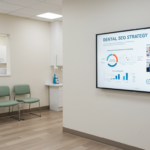UX Design Services: Agency vs Consultant – What’s Better?
When businesses think of improving their user experience (UX), they often face a critical decision: should they go with an agency or a consultant? Both offer valuable expertise, but the choice depends on your business needs, goals, and project specifics. Let’s delve into the differences, advantages, and unique offerings of both UX agencies and consultants, so you can make an informed decision.
Introduction to UX Design Services
Defining UX Design
At its core, User Experience (UX) design is about crafting a seamless, intuitive, and engaging experience for users interacting with a product or service. From websites to mobile apps, good UX design ensures that users can navigate effortlessly, achieving their goals without frustration. UX design covers a broad range of elements, including usability, interface design, and user research. Read our in-depth blog on UX Design here.
The Role of UX in Modern Business
In today’s competitive market, businesses can’t afford poor user experiences. A well-designed UX can increase conversion rates, customer satisfaction, and brand loyalty. Whether you’re launching a new product or revamping an old one, UX design is crucial for staying relevant in the digital landscape.
What Are UX Design Agencies?
Services Offered by UX Agencies
UX design agencies are full-scale operations that offer a wide range of services, from research and wireframing to prototyping and usability testing. Typically, agencies come with a team of designers, researchers, project managers, and developers who collaborate on large projects.
Types of Businesses That Benefit from Agencies
Agencies often work best for large-scale businesses that require comprehensive UX solutions. Whether it’s an enterprise-level software company or a national retailer, agencies are adept at handling complex, multifaceted projects with many moving parts.
Who Are UX Design Consultants?
Key Responsibilities of UX Consultants
A UX consultant typically works independently or in smaller teams, providing specialised expertise. Unlike agencies, which often take on the entire project, a consultant may be brought in to offer strategic advice, run usability testing, or fine-tune the design of a particular element.
Types of Projects Where Consultants Shine
Consultants excel in projects that require a more tailored, hands-on approach. For businesses with limited budgets or smaller-scale needs, hiring a consultant can offer direct access to an experienced professional who can guide the project to success.
Key Differences Between Agencies and Consultants
Team Structure
Agencies come with large teams that work on your project in various capacities. In contrast, consultants are usually solo operators or part of a small, focused team. If you value a single point of contact, a consultant might be the better choice.
Flexibility and Agility
Consultants tend to be more agile, quickly adapting to changes and shifting project priorities. In comparison, agencies can be slower to pivot due to their structured workflows and internal processes.
Client Communication
Working with a consultant means direct, one-on-one communication. You’ll get personalised updates and quicker responses. With agencies, communication is usually handled through account managers, which can sometimes feel distant and impersonal.
Cost Comparison: UX Design Agency vs Consultant
Agency Pricing Models
Agencies often come with higher price tags due to their larger teams, overhead costs, and wide array of services. You might be billed hourly or on a project basis, but expect a more significant investment overall.
Consultant Pricing Models
Consultants are generally more cost-effective. With fewer overheads and a more focused service offering, they provide excellent value, particularly for small to medium businesses looking for expert guidance without breaking the bank.
Project Size and Scope: Who’s Better Suited?
Large-Scale Projects
For large-scale projects, agencies are usually the go-to choice. They have the manpower, resources, and diverse skill sets required to tackle complex projects that span multiple months.
Small to Medium Projects
Consultants, on the other hand, are often the perfect fit for small to medium projects. They can provide the expertise you need without the hefty price tag and are usually more flexible in adapting to project changes.
Turnaround Time: How Quickly Can You Expect Results?
Agency Timeframes
Agencies typically work with longer timeframes, as their processes are more structured and involve multiple stakeholders. However, the depth and breadth of their work make up for this extended timeline.
Consultant Timeframes
If speed is of the essence, a consultant may be the better choice. Their nimble approach allows them to deliver results more quickly, often without sacrificing quality.
Quality of Work: Does One Deliver Better Results?
Expertise in Agencies
Agencies bring a diverse set of skills to the table, making them great for projects that require input from multiple disciplines. They can produce work of high quality, but it often comes with more bureaucracy and less personal attention.
Personal Touch in Consultants
Consultants, due to their individual or smaller-team nature, offer a personal touch. You’re likely to receive more attention to detail, as the consultant will be deeply invested in the outcome of the project.
Innovation and Creativity: Who Leads the Way?
Team-Based Creativity in Agencies
Agencies can draw on the creativity of an entire team, fostering innovation through collaboration. This diversity of thought can lead to more out-of-the-box solutions, especially for large-scale projects.
Independent Innovation in Consultants
Consultants, being independent thinkers, often approach problems from unique perspectives. Their innovative ideas can help small businesses differentiate themselves without the influence of agency groupthink.
Customisation and Personalisation in UX Design
Custom Solutions from Agencies
While agencies can provide custom solutions, they tend to follow established processes. This means less flexibility and personalisation in comparison to a consultant’s bespoke approach.
Tailored Approaches by Consultants
Consultants pride themselves on offering highly tailored solutions. They take the time to understand your specific needs and can customise the UX design to fit perfectly with your business goals.
Communication and Collaboration: Agency vs Consultant
Agency Communication Models
Agencies have established communication models, often relying on account managers to handle client relations. This can create a layer of distance between you and the designers actually working on your project.
Direct Contact with Consultants
With consultants, you’ll have direct contact throughout the process. This can lead to faster decision-making and better collaboration, ensuring your vision is always front and centre.
Which Is Better for Your Business?
When to Choose an Agency
If you’re working on a massive project with complex requirements and need the backing of a large team, an agency is likely the right choice. Their structured approach and broad expertise will ensure the project is handled efficiently.
When a Consultant is the Right Fit
For businesses seeking a more personal approach, with tailored advice and hands-on involvement, a consultant is often the better fit. Their flexibility, cost-effectiveness, and specialised attention make them ideal for smaller projects or businesses with specific needs.
Future Trends in UX Design: Agencies and Consultants
The Rise of UX Consultants
As businesses continue to prioritise personalisation and flexibility, the demand for UX consultants is rising. Their ability to offer bespoke solutions is becoming increasingly attractive in a market that values individuality.
Agencies Adapting to New UX Challenges
Agencies are also evolving, finding ways to integrate more personalised services and agile workflows to remain competitive. As the UX landscape changes, both agencies and consultants will continue to play important roles.
Conclusion
Choosing between a UX design agency and a consultant ultimately depends on your project’s size, budget, and specific needs. Agencies offer the manpower and resources for large, complex projects, while consultants provide a more personalised, flexible, and cost-effective approach. If you’re looking for tailored, expert advice without the bureaucracy, a consultant might be your best bet. That personal touch, combined with direct communication and customised solutions, often tips the scales in their favour for businesses seeking a more intimate partnership.
FAQs
A UX consultant specialises in improving the user experience of a product or service by offering expert advice, conducting usability tests, and guiding the design process.
Yes, UX design agencies tend to be more expensive due to their larger teams, overheads, and comprehensive service offerings.
If your project is smaller in scale, requires specialised attention, or you prefer a more hands-on approach, a UX consultant could be the perfect fit.
Both can deliver high-quality results, but agencies work best for large-scale, complex projects, while consultants excel in offering personalised, detailed solutions.
It’s possible, but not always recommended, as it may disrupt workflow. However, if you find that a more tailored approach is needed, transitioning to a consultant could provide the focus your project requires.









